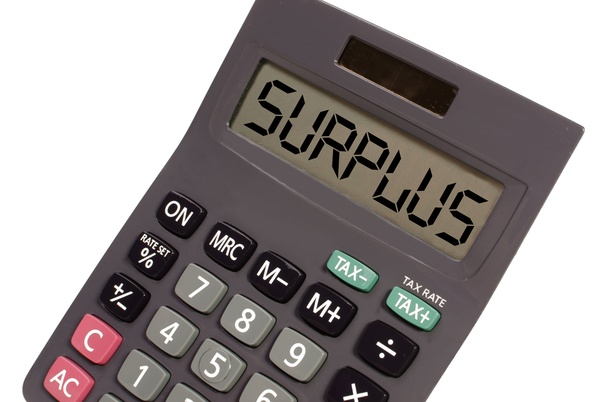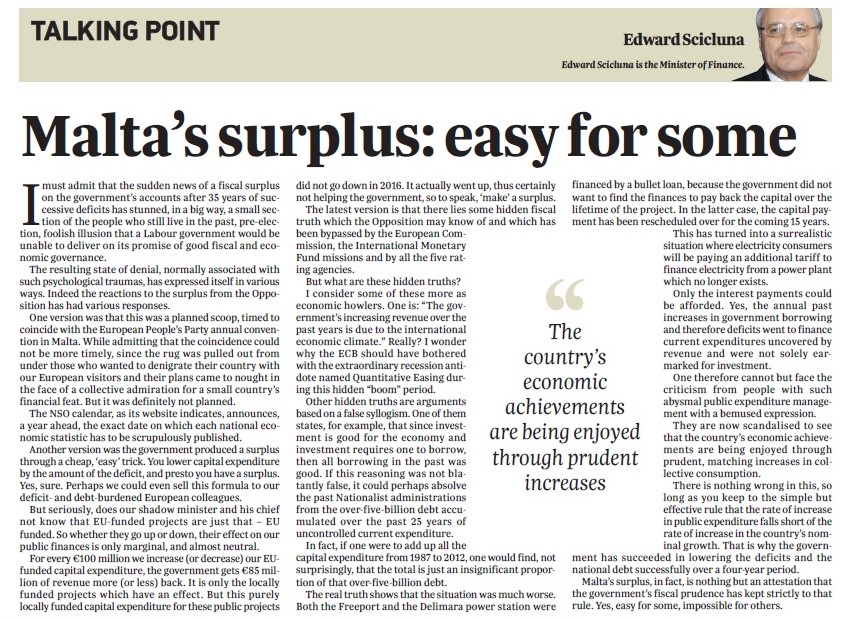I must admit that the sudden news of a fiscal surplus on the government’s accounts after 35 years of successive deficits has stunned in a big way a small section of the people who still live in the past pre-election foolish illusion that a Labour government would be unable to deliver its promise of good fiscal and economic governance. The resulting state of denial, normally associated with such psychological traumas, has expressed itself in various ways. Indeed the reactions to the surplus by the Opposition has had various responses.
One version was that this was a planned scoop, timed to coincide with the Opposition European People’s Party annual convention in Malta. While admitting that the coincidence could not be more timely, since the rug was pulled from underneath those who wanted to denigrate their country with our European visitors, and their plans came to nought in the face of a collective admiration for a small country’s financial feat. But it was definitely not planned. The NSO calendar, as its website indicates, announces, a year ahead, the exact date on which each national economic statistic has to be scrupulously published.
Another version was that the government produced a surplus through a cheap “easy” trick. You lower capital expenditure by the amount of the deficit and presto you obtain a surplus. Yes, sure. perhaps we could even sell this formula to our deficit and debt-burdened European colleagues. But seriously does our shadow minister and his chief not know that EU funded projects are just that – EU funded. So whether they go up or down their effect on our public finances are only marginal, and almost neutral. For every 100 million we increase (decrease) our EU funded capital expenditure, the government get 85 million of revenue more (less) back. It is only the locally funded projects which have an effect. But this purely locally funded capital expenditure for these public projects capital expenditure did not go down in 2016. It actually went up, thus certainly not helping the government, so to speak, “make” a surplus.
The latest version is that there lies some hidden fiscal truth which the Opposition may know of and which has been by-passed by the European Commission, the International Monetary Fund missions, and by all the five Rating Agencies. But what are these hidden truths? I consider some of these more as economic howlers. One is that “The government’s increasing revenue of over the past years is due to the international economic climate.” Really? I wonder why the ECB should have bothered with the extraordinary recession antidote named Quantitative Easing during this hidden “boom” period.
Other hidden truths are arguments based on a false syllogism. One of them states for example that since investment is good for the economy, and that investment requires one to borrow, then all borrowing in the past was good. If this reasoning was not blatantly false it could perhaps absolve the past Nationalist administrations from the over-5 billion euro debt accumulated over the past 25 years of uncontrolled current expenditure. In fact if one were to add up all the capital expenditure from 1987 to 2012 one would find not surprisingly that the total is just an insignificant proportion of those over-5 billion euro debt.
The real truth shows that the situation was much worse. Both the Freeport and the Delimara power station were financed by a bullet loan because the government did not want to find the finance to pay back the capital over the life time of the project. In the latter case the capital payment has been rescheduled over for the coming 15 years. This has turned into a surrealistic situation where electricity consumers will paying an additional tariff to finance electricity from a power plant which no longer exists.
Only the interest payments could be afforded. Yes, the annual past increases in government borrowing and therefore deficits went to finance current expenditures uncovered by revenue and were not solely earmarked for investment.
One therefore cannot but face the criticism by people with such an abysmal public expenditure management with a bemused expression. They are now scandalised to see that the successes of the country’s economic achievements are being enjoyed through prudent matching increases in collective consumption.
There is nothing wrong in this, so long as you keep to the simple but effective rule that the rate of increase in public expenditures falls short of the rate of increase in the country’s nominal growth. That is why the government has succeeded in lowering the deficits and the national debt successfully over a four year period.
Malta’s surplus, in fact is nothing but, an attestation that government’s fiscal prudence has kept strictly to that rule. Yes, easy for some, impossible for others.

